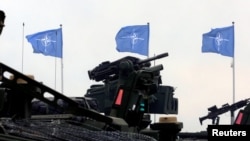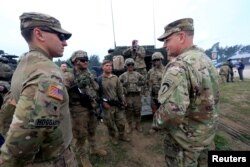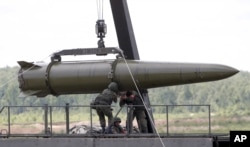The United States is concerned about possible Russian incursions along NATO's Baltic borders during large Russian military exercises in September and will send more troops to the area, the commander of U.S. troops in Europe said on Friday.
Russia has denied Western concerns that its Zapad 2017 war games will threaten stability in eastern Europe. NATO officials believe the exercises could involve more than 100,000 troops, the biggest such Russian maneuvers since 2013.
"When [Russia] went into Crimea, that was against the backdrop of an exercise. When they went into Georgia - that was an exercise," Lieutenant General Ben Hodges told Reuters.
"Their history is full of examples where they don't live up to any treaties ... They routinely violate those things," he said during a NATO exercise in Poland.
Russia annexed Ukraine's Black Sea peninsula of Crimea in 2014 and in August 2008 it sent troops into Georgia, saying it was protecting civilians in Georgia's South Ossetia region.
The Crimea annexation has plunged East-West ties to their lowest levels since the Cold War, with Western governments imposing economic sanctions on Russia. NATO has sent troops to the Baltics and Poland to deter any possible Crimea-style land grab.
Replying to a question, Hodges said he, like Lithuania, was concerned that the Russian exercises could lead to provocative action on Baltic borders.
He said the United States would deploy three units of up to 600 airborne troops across the Baltic States for the duration of Zapad 2017.
"We are all working hard to be at the highest levels of readiness during exercises like this," Hodges said.
Previous Russian large-scale exercises in 2013 employed special forces training, longer-range missiles and unmanned aerial vehicles that were later used in Russia's annexation of Crimea, its support for separatists in eastern Ukraine and in its intervention in Syria, NATO diplomats said.
Officials expect the exercise, in which Russian ally Belarus will also take part, could involve nuclear weapons training.
Nuclear-capable mid-range modern Iskander missiles will be again deployed in the Russian Baltic enclave of Kaliningrad during the exercise, the officials said.
Estonia's defense minister said in April that Russia may use Zapad to move troops permanently into Belarus later this year in a warning to NATO. Russia's defense ministry did not immediately reply to a Reuters request for comment on the subject.
Three U.S. exercises will be underway at the same time as Zapad, in Sweden, Poland and Ukraine, and a U.S. armored brigade team is already deployed in Europe.
U.S. Defense Secretary Jim Mattis called the forthcoming Russian build-up "destabilizing" last month, and officials suggested the U.S. Army will be deploying a battery of Patriot missiles to Lithuania for two weeks in July.







